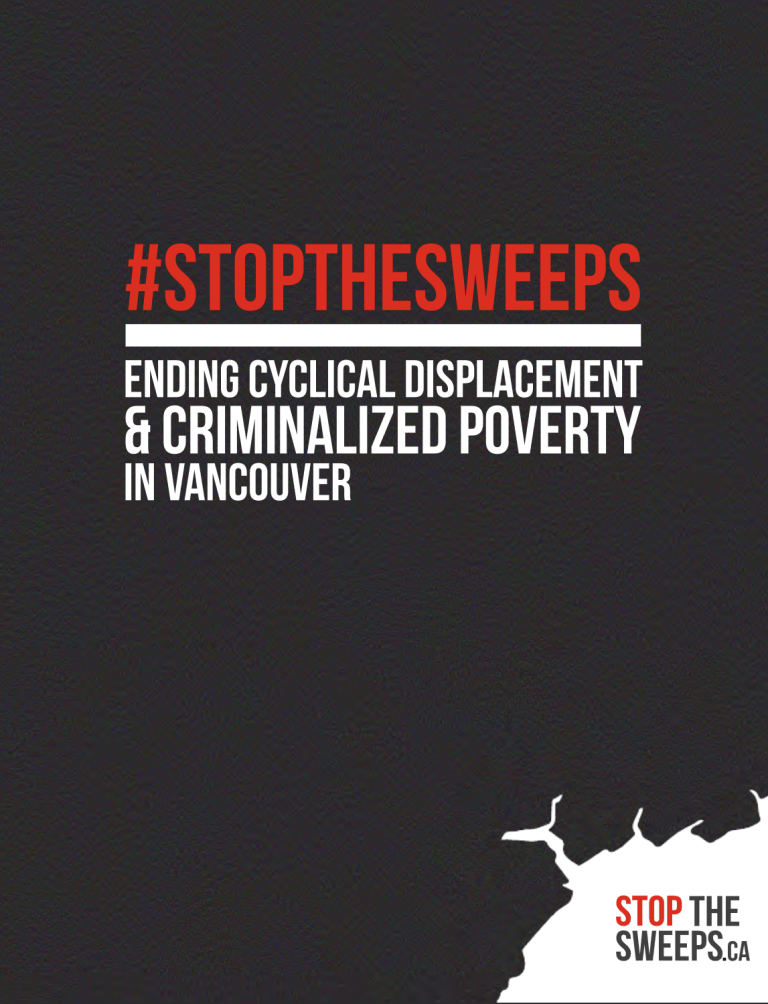10 search results
Demands
Recommendation 1: Eliminate the enforcement of Street and Traffic By-Laws against people who rely on public space.-
Category and theme:
Audience:
Groups affected:
Demands
Recommendation 2: Defund City Engineering & Police Budgets and redirect funds currently allocated to Street Sweeps, in order to redistribute resources and funds for cleaning to local organizations and individuals who reside in affected areas.-
Category and theme:
Audience:
Groups affected:
Demands
Recommendation 3: Implement directives related to the confiscation of belongings from people who rely on public space, which recognize that this practice has continued potential for harmful and discriminatory impacts.- In the rare event that belongings must be confiscated, directives should clearly detail how City staff are to protect the rights and dignity of those who are impacted, including rights to procedural fairness.
- City staff must provide at least 24 hours of advance notice prior to seizure.
- If someone’s belongings are justifiably confiscated, City staff must provide a receipt that details what was taken, and clear instructions on how to retrieve personal belongings.
-
Category and theme:
Audience:
Groups affected:
Demands
Recommendation 4: Provide funding to storage facilities in an easily-accessible area.- Any confiscated belongings must be stored at a facility located within the Downtown Eastside.
- Storage facilities must be secure, easily accessible, of an adequate size, and informed by best practices and cultural safety for people who rely on public space.
- Retrieval processes must respect the limited access unhoused people have to identifying documentation.
- Storage facilities must provide long-term, low-barrier storage space (i.e. 3-6 months).
-
Category and theme:
Audience:
Groups affected:
Demands
Recommendation 5: Conduct a peer-led stigma audit to specifically review the operations of City Engineering Services to identify instances of potential discrimination on the basis of social condition.-
Category and theme:
Audience:
Groups affected:
Demands
Recommendation 6: Drastically expand permanent parklets, green spaces, hygiene facilities, garbage disposal sites, and other public outdoor amenities such as covered cooking facilities, and cultural programming sites through the DTES, as these are essential public spaces.-
Category and theme:
Audience:
Groups affected:
Demands
Recommendation 7: Lobby the provincial government to add “social condition” as a protected ground in BC’s Human Rights Code, as recommended by the Office of the Human Rights Commissioner.-
Category and theme:
Audience:
Groups affected:
Municipal policy on confiscation
Recommendation 8: The City of Vancouver should develop a policy on the confiscation of belongings by City Engineering Workers and police which recognizes the fundamental harms caused by the confiscation of belongings from people who rely on public space. The City should instruct its employees to end the confiscation of the belongings of people who rely on public space, especially necessities of life such as shelter, clothing, medication, and important personal items. When City staff must confiscate personal belongings, the City must provide at least 24 hours of advance notice, and when confiscation is justified, direct staff to issue receipts for belongings and cash, details on retrieval, and clear instructions on how people can get their property back. Any confiscated belongings must be stored in an accessible location within the DTES that people can easily attend.-
Category and theme:
Groups affected:
Inclusion of directly impacted communities
Recommendation 9: Non-profit and non-governmental workers should not just receive the mandate to conduct Street Sweeps, nor should civilians be “deputized” to do this work. Any alternative to Street Sweeps should be peer-led, specifically led by the community organizers who are currently experiencing Sweeps. These folks live, and survive, the realities of Street Sweeps and are best-situated to discern appropriate and long-term solutions.-
Category and theme:
Groups affected:
Conclusion
Recommendation 10: Ending Street Sweeps will require cross-department collaboration between the City of Vancouver, Park Board, and Vancouver Police Department. Each of these institutions must commit to the elimination of Street Sweeps. By eliminating costly and traumatic Street Sweeps, the City could fund peer-led programming, including community clean-ups, street and sidewalk maintenance, vending support, and the management of storage facilities.-
Category and theme:
Groups affected:
